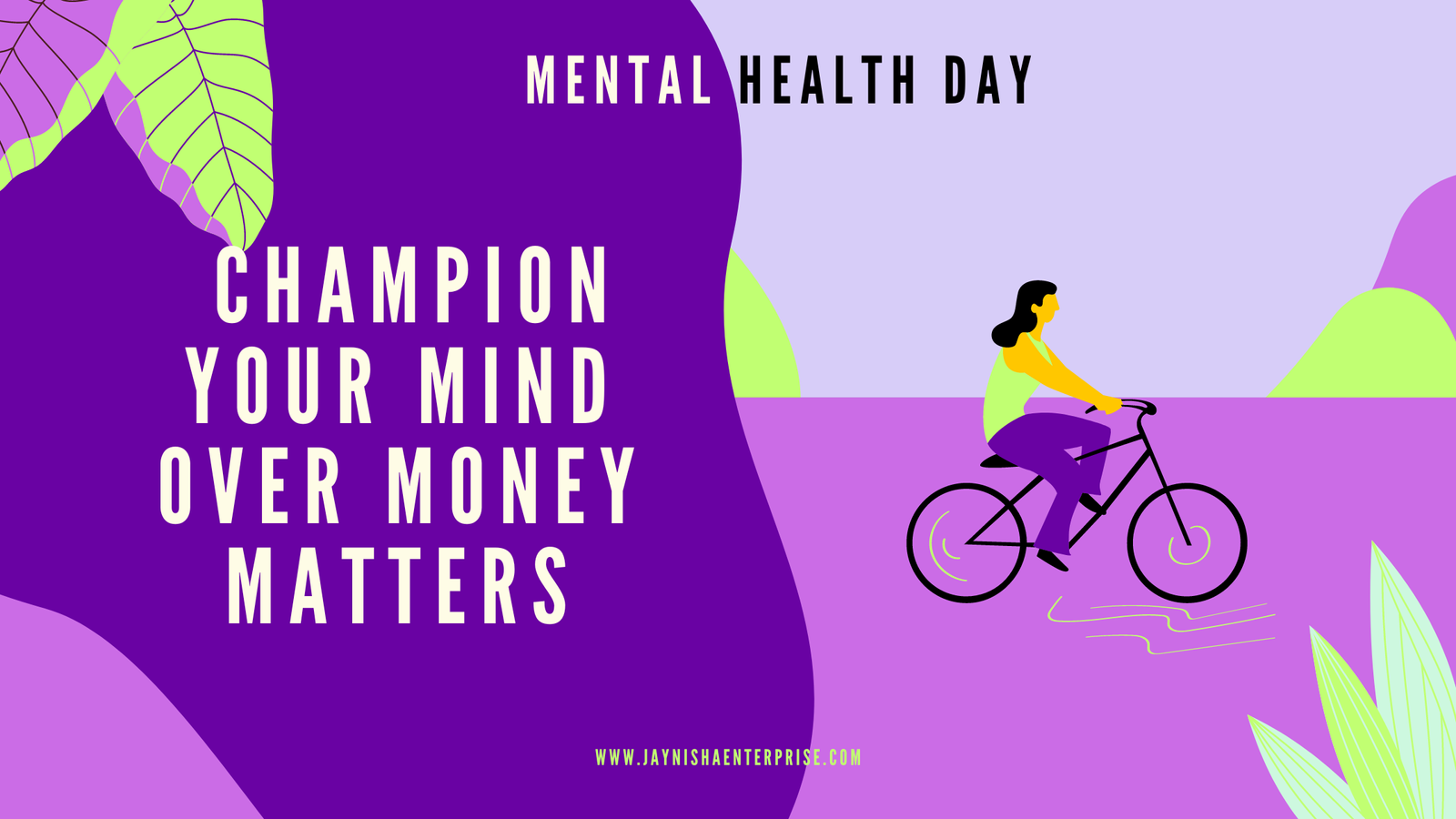Mental Health Day 2024: Why Mental Well-being Matters Over Money
Introduction:
In today’s fast-paced world, the race for financial success often overshadows what truly matters—our mental health. Mental Health Day 2024 serves as a reminder to prioritize our mental well-being over the relentless pursuit of money. As we prepare for this global event, it’s crucial to understand the profound impact financial stress has on our emotional and psychological health. With staggering data showing rising mental health concerns, it’s time to reflect on how we can strike a balance between financial stability and mental well-being.
Understanding Mental Health and Mental Well-being
Defining Mental Health
Mental health involves our emotional, psychological, and social well-being. It influences how we think, feel, and act. According to the World Health Organization (WHO), nearly 1 in 8 people globally live with a mental disorder. Mental health affects every aspect of life, from relationships and decision-making to stress management and productivity.
The Importance of Mental Well-being
Mental well-being is not just the absence of mental illness but a state of overall psychological health. Financial stress, especially when compounded, can severely degrade mental well-being. Research from The American Psychological Association (APA) reveals that 72% of adults report feeling stressed about money at some point in their life. This constant stress can lead to burnout, anxiety, and depression.
Mental Health vs. Financial Success
While financial success is important, it often comes at the cost of mental health. In a 2019 survey by Gallup, 44% of workers reported that their job frequently makes them stressed. People who prioritize their careers over their well-being tend to experience more severe stress-related conditions. When mental health takes a back seat, productivity, happiness, and overall quality of life diminish.
World Mental Health Day 2024 – A Global Call for Action
What is World Mental Health Day?
Established in 1992 by the World Federation for Mental Health, World Mental Health Day is observed annually on October 10th. It aims to raise awareness and promote mental health education globally. The 2024 theme focuses on “Breaking the Stigma Around Mental Illness,” highlighting the importance of open conversations about mental health.
World Mental Health Day 2024: Key Themes
This year, Mental Health Day emphasizes access to mental health services. According to a 2020 report by Mental Health America, 56% of adults with a mental illness receive no treatment, mostly due to stigma or financial constraints. With the rise in mental health awareness, the 2024 campaign seeks to change that, promoting policies that make mental health services more accessible and affordable.
How to Participate in World Mental Health Day
Mental Health Day offers numerous ways for individuals to get involved. Whether attending local events, spreading awareness through social media, or donating to mental health causes, everyone can make a difference. Participating in such campaigns helps foster a culture of support and understanding for those struggling with mental health.
The Link Between Mental Health and Money
Financial Stress and Its Impact on Mental Health
Financial worries are one of the leading causes of anxiety and depression worldwide. A study by Debt.org found that people in debt are 3 times more likely to have mental health issues. The stress from struggling with bills, debt, and lack of savings often manifests in sleeplessness, irritability, and strained relationships.
The Cost of Ignoring Mental Health for Financial Gains
Prioritizing financial gain at the expense of mental health can have long-term negative effects. A Harvard Business Review article explains that workplace burnout costs companies $125 billion to $190 billion in healthcare spending annually. This emphasizes how untreated mental health issues ultimately affect the workforce and the broader economy.
Creating a Healthy Relationship Between Mental Health and Money
Achieving a balance between financial stability and mental well-being is crucial. Individuals need to develop a healthy mindset toward money by setting realistic financial goals and investing in their mental health. Using budgeting tools, seeking financial counseling, and making time for self-care are key steps to ensuring that money doesn’t overtake mental well-being.
Mental Health in the Workplace
The Importance of Mental Well-being at Work
Workplace mental health is a growing concern, especially with rising demands and performance expectations. Forbes reports that 76% of employees experience moderate to severe burnout, which directly impacts their productivity and job satisfaction.
Creating Supportive Work Environments
Some companies are taking steps to address this issue by offering mental health days, counseling, and wellness programs. Google, for instance, provides free therapy sessions for its employees, while Microsoft has implemented mental health check-ins to create a more supportive environment.
Mental Health Over Money in Career Choices
Choosing a career solely for financial reasons can be detrimental. Many people are now opting for roles that offer flexibility and a healthier work-life balance. Prioritizing mental health when making career decisions can lead to greater long-term satisfaction and reduce the risk of burnout.
Practical Tips for Improving Mental Health and Financial Balance
Mindfulness and Financial Decision-Making
Practicing mindfulness can significantly reduce financial stress. By focusing on present-moment awareness, individuals can make better financial decisions. According to Mindful.org, practicing mindfulness reduces stress by 30% and can help people feel more in control of their financial situation.
Self-care Practices That Don’t Break the Bank
Contrary to popular belief, self-care doesn’t have to be expensive. Free or low-cost activities like exercising, journaling, and using free mental health apps (such as Moodfit or Headspace) can greatly enhance mental well-being without straining finances.
Seeking Professional Help Without Financial Strain
Accessing mental health support doesn’t have to be financially burdensome. Many organizations offer sliding-scale fees or community services that make therapy affordable. BetterHelp, for instance, provides online counseling services at more affordable rates, while Open Path Collective connects people with low-cost mental health professionals.
FAQs
What is the importance of mental health?
Mental health is essential because it affects every aspect of life, from decision-making and relationships to productivity and overall happiness.
How does financial stress impact mental health?
Financial stress is linked to increased anxiety and depression, contributing to sleep disorders, reduced productivity, and chronic health conditions.
What is World Mental Health Day, and why is it important?
World Mental Health Day is a global event that raises awareness about mental health issues and promotes the importance of accessible mental health care.
How can I participate in World Mental Health Day 2024?
You can participate by attending local events, supporting mental health charities, or raising awareness through social media.
Conclusion: Choosing Mental Health Over Money
Ultimately, while financial stability is important, it should never come at the cost of our mental health. Mental Health Day 2024 reminds us to prioritize mental well-being in both our personal and professional lives. By taking proactive steps toward better mental health, we can lead happier, more balanced lives.







Leave a Reply